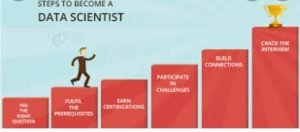How Can I Become a Data Scientist ?

Data science is one of the most rapidly increasing professions in the twenty-first century. Big Data provides answers to critical concerns in every industry, from businesses to non-profits to government agencies. There is an almost limitless amount of data that can be sorted, evaluated, and used for a variety of purposes. This article will answer the question: ” How can I become a data scientist?”.
How can a company go through purchase data to develop a marketing strategy? How can government agencies leverage behavioral patterns to develop fun community activities? How can a non-profit make the most of its marketing money in order to improve its operations?
It ultimately boils down to data scientists’ efforts. Data scientists are trained to collect, organize, and analyze data, and they assist people from all walks of life and industries.
Data scientists come from a variety of educational backgrounds, although the majority will have some form of technical education. A wide range of computer-related majors, as well as math and statistics, are included in data science degrees. Training in business or human behavior is also popular, which helps data scientists reach more accurate findings.
Related Post:How to get a cyber security degree
Because there is an almost unlimited amount of data, data scientists have an almost infinite number of applications. Take a deeper look at the entire career. Investigate what they do, who they serve, and what talents they require to complete the task. Continue reading to learn how to become a data scientist and get started on this lucrative career path!
Data Scientist’s Definition
A data scientist is essentially someone who collects and analyzes data with the purpose of obtaining a conclusion. They use a variety of methods to accomplish this.
They may display the data in a visual context, or data visualization, noting clear data trends that might otherwise go unnoticed if the data was presented in hard numbers on a spreadsheet.
Data scientists frequently develop sophisticated algorithms that are used to identify patterns, extract information from a tangle of numbers and statistics, and generate information that is beneficial to a company or organization. Data science is, at its most basic level, the process of finding significance in large amounts of data.
The Application of Data Science in the Real World
Let’s take a look at a common scenario with a data scientist. Perhaps a cell phone provider wants to know which of its present clients are most likely to move to a competitor’s service. The corporation may pay a data analyst to examine millions of data points (or, more precisely, construct an algorithm to examine millions of data points) relating to previous clients. Customers who consume a specific amount of bandwidth are more likely to quit, or customers who are married and between the ages of 35 and 45 are the most likely to move carriers, according to that data analyst (or scientist). To engage and retain these customers, the cell phone carrier can adjust its business model or marketing initiatives.
Every time a Netflix user logs in, they see a real-world example of data management in action. The video streaming service features a program that will provide recommendations based on your preferences. An algorithm uses information from your previous viewing behavior to make recommendations for shows you might love. This may be observed in services such as Pandora’s thumbs-up and thumbs-down buttons, as well as Amazon’s buying recommendations.
What Does It Take to Become a Data Scientist?
To become a data scientist, follow these three steps:
- Obtain a bachelor’s degree in information technology, computer science, mathematics, business, or a related discipline;
- Obtain a master’s degree in data science or a closely related discipline;
- Obtain experience in the field in which you wish to work (ex: healthcare, physics, business).
Who Makes a Good Data Scientist?
So, what are the most important characteristics of a data scientist? How can you tell if you have the necessary raw materials for a long career in data science?
Candidates must have a curious nature that drives them to study new things on a regular basis. A data scientist must have an inherent curiosity that drives their quest to find solutions because there are so many regions and data points to study.
Aspiring data scientists must have excellent organizational skills. As previously said, there are millions of potential data points, therefore ensuring that data is structured in a meaningful manner is critical.
Specializations in Data Science
Data science is required by practically every business, organization, and government agency in the United States and around the world, thus there is plenty of room for specialization. Many data scientists will have a strong background in business, either in specific industries (such as automotive or insurance) or in business-related subjects (such as marketing or finance).
A data scientist working for a car dealership, for example, would specialize in customer or marketing analysis, campaign development, and improving sales projections. Another data scientist working for a large retail chain might specialize in forecasting, identifying the ideal pricing range for their products in order to maintain the chain competitive in the market.
Some data scientists work for the Defense Department, specializing in threat level research, while others help tiny startup businesses attract and keep consumers. A data scientist’s skills and knowledge can be applied in a variety of ways by businesses, organizations, and government bodies.
Related Post:Best Art Schools in the world
Career Path for Data Scientists
Graduates frequently require on-the-job training before they can get started in their careers. This training is frequently focused on a company’s unique programs and internal systems. Advanced analytics techniques that aren’t taught in college may be included.
Because the field of data science is continually evolving, it is critical to continue your education while working in this profession. Data scientists continue to educate themselves throughout their careers in order to be on the cutting edge of information and technology.
Jobs for Data Scientists
Data scientists operate in a variety of venues, but the majority work in offices where individuals can collaborate on projects, work in teams, and communicate efficiently. Uploading statistics and data into the system or generating code for a program that will analyze the data could be a large part of the job.
The pace, atmosphere, and overall tempo of the workplace will be primarily determined by the organization and industry in which you work. You could work in a fast-paced atmosphere where quick results are valued, or you could work for a company that appreciates slow, deliberate, and detailed advancement.
Depending on the type of data science you are pursuing and the nature of the organizations you work for, you may discover a work atmosphere that encourages creative thinking or one that is intended for efficiency and effectiveness.
Advantages and disadvantages
There are numerous advantages to working as a data scientist, and they are not all financial. The job is a unique yet demanding vocation that provides a wide variety of everyday activities, and one of the key perks is the variety. You might work as a data scientist for a company, developing solutions and information for customer retention, marketing, new products, or general business solutions. This means you will have the opportunity to participate in unique and interesting themes and issues that will provide you with a broad view on the economy and the world at large.
There are certain obvious disadvantages to this vocation, just as there are to any other. While the wide range of subjects provides new challenges, it also means that you may never be able to fully immerse yourself in one. Because the technologies you employ are always evolving, you may find that the systems and applications you’ve just mastered are suddenly being replaced by newer technology. You’ll find yourself having to master an entirely new system before you know it. As a result, the work is fast-paced.
Salary of a Data Scientist
Whatever source you use, one thing is certain: these professionals will be able to make a good living.
The Bureau of Labor Statistics, which counts data science careers alongside mathematical scientific occupations, is the greatest source for salary information.
People working in these combined fields earned an average yearly income of $103,930 in 2020, according to the BLS. The typical median compensation for data scientists is $96,455 per year, according to Payscale.
These figures appear to be in line with wage data from other sources as well. According to Glassdoor, the average compensation is around $113,450. A data scientist with nine years or more experience may expect to make over $150,000, while those in charge of teams of 10 or more can expect to earn around $232,000.
These sophisticated skills are in high demand, according to any source. If you have the necessary skills, training, and knowledge to become a data scientist, you will most likely earn a good living for the rest of your life. There’s more good news: these professionals are expected to be in high demand for the foreseeable future.
In 2021, how do you become a data scientist?
Study data science or a closely related field at the undergraduate level.
To get your foot in the door as an entry-level data scientist, you’ll need at least a bachelor’s degree in data science or a computer-related discipline, however most data science jobs will require a master’s degree. Degrees can give your résumé structure, internships, networking opportunities, and acknowledged academic qualifications. If you have a bachelor’s degree in a different profession, you may need to focus on online short courses or bootcamps to build the skills required for the job.
- Learn the skills needed to work as a data scientist.
- Machine Learning Techniques Programming
- Reporting and Data Visualization
- Risk Assessment
- Effective Communication Statistical Analysis and Math
- Skills in Software Engineering
- Research on data mining, cleaning, and munging
- Platforms for Big Data
- Cloud-based applications
- Structures and data warehousing
Think about specializing.
Data scientists might specialize in a certain industry or gain strong abilities in areas like artificial intelligence, machine learning, research, and database management. Specialization is a good method to boost your income potential while also doing work that you enjoy.
Get your first employment as a data scientist at an entry-level position.
You should be ready for your first data science career once you’ve gained the necessary abilities and/or specialization. Creating an online portfolio to demonstrate a few projects and your accomplishments to potential employers may be beneficial. Because your initial data science job may not have the title of data scientist, but rather an analytical role, you should look for a company with space for growth. You’ll soon learn how to operate as part of a team and best practices, which will help you advance to more senior roles.
Look for extra data scientist credentials and post-graduate education.
Here are a few useful-skills-focused certifications:
Professional in Analytics Certification (CAP)
The Institute for Operations Research and the Management Sciences (INFORMS) developed CAP, which is aimed at data scientists. Candidates must demonstrate their knowledge of the end-to-end analytics process during the certification exam. This involves problem conceptualization, data and methodology, model construction, deployment, and life cycle management, among other things.
SAS Enterprise Miner 14 SAS Certified Predictive Modeler
SAS Enterprise Miner users who undertake predictive analytics will benefit from this certification. Candidates must have a thorough understanding of the predictive modeling capabilities in SAS Enterprise Miner 14. 6. Have a master’s degree in data science.
Academic credentials can be more crucial than you think. Is a master’s degree required for most data science jobs? It varies by employment, and some data scientists have a bachelor’s degree or have completed a data science bootcamp.
Related Post:Difference between GRE and GMAT – Which is easier ?







